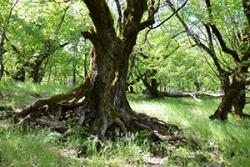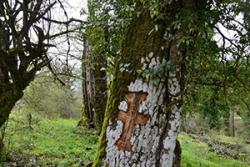Conservation through religion? Scientists confirm that sacred natural sites confer biodiversity advantage
 ‘Our Lady of the Nightingales’ - the sacred forest of Panagia Aidonolaloussa. Branches, roots and holes of giant old oaks, Judas-trees, mahaleb cherries and hornbeams bring a Tolkienesque air to this ancient woodland. : Photo © K. StaraSacred natural sites (SNS) are found all over the world. They are thought to play an important role in conservation but until recently there was little systematic investigation of this claim. Now, published in the journal Biological Conservation by an international and multidisciplinary team, led by the University of Ioannina and including ������ϲʹ�������, has shown that there is a notable conservation benefit to SNS. The researchers of the project, known as THALIS-SAGE, chose for their study the region of Epirus, in north-western Greece, that is host to numerous sacred groves protected through religion for hundreds of years.
‘Our Lady of the Nightingales’ - the sacred forest of Panagia Aidonolaloussa. Branches, roots and holes of giant old oaks, Judas-trees, mahaleb cherries and hornbeams bring a Tolkienesque air to this ancient woodland. : Photo © K. StaraSacred natural sites (SNS) are found all over the world. They are thought to play an important role in conservation but until recently there was little systematic investigation of this claim. Now, published in the journal Biological Conservation by an international and multidisciplinary team, led by the University of Ioannina and including ������ϲʹ�������, has shown that there is a notable conservation benefit to SNS. The researchers of the project, known as THALIS-SAGE, chose for their study the region of Epirus, in north-western Greece, that is host to numerous sacred groves protected through religion for hundreds of years.
By studying a wide range of plant and animal taxonomic groups in eight sacred natural sites and comparing their diversity with nearby control sites, mostly reforested areas, the researchers found that the SNS have a small but persistent biodiversity advantage. This advantage is expressed in a number of ways, the most clear indication being the existence of more distinct communities of species amongst the sacred groves than amongst control sites (a measure called beta diversity).
The most notable species group for having higher biodiversity in the sacred natural sites than the control sites was the fungi, often growing in the dead wood of old trees. For the passerine birds (perching birds, which include many song birds) that have been designated as having conservation importance at a European level, twice as many species (eight) were present in the sacred natural sites as in the control sites (four).
It is often asserted that the conservation benefits of SNS are marginal owing to their usually-small sizes. However, this study finds the influence of size to be relatively weak and shows that even small SNS can play a considerable role in biodiversity conservation.
 The carved cross in the trunk of this oak tree is a recent offering from a young shepherd to Saint Nikolas, patron of the church in Vitsa's sacred forest. : Photo© K. StaraDespite their role in conserving biodiversity, the SNS of Epirus are now themselves endangered. This is due to changing demographics and land use, primarily through rural depopulation in most mountainous areas of Epirus since WW2. Given recent rural depopulation, it is difficult for local communities to continue to enforce the rules, which used to protect their SNS as locally adapted management systems. For this reason, the THALIS-SAGE project also included initiatives for the promotion of their and educational value. ������ϲʹ������� project partner, Professor John Healey, of the School of Environment, Natural Resources & Geography and University of Ioannina project leader, Professor John Halley, conclude that “the best conservation strategy for these and other SNS of similar sizes worldwide is to link them in networks within conventional conservation schemes”. Project researcher, Dr Kalliopi Stara, added “this needs to be done in collaboration with local communities”.
The carved cross in the trunk of this oak tree is a recent offering from a young shepherd to Saint Nikolas, patron of the church in Vitsa's sacred forest. : Photo© K. StaraDespite their role in conserving biodiversity, the SNS of Epirus are now themselves endangered. This is due to changing demographics and land use, primarily through rural depopulation in most mountainous areas of Epirus since WW2. Given recent rural depopulation, it is difficult for local communities to continue to enforce the rules, which used to protect their SNS as locally adapted management systems. For this reason, the THALIS-SAGE project also included initiatives for the promotion of their and educational value. ������ϲʹ������� project partner, Professor John Healey, of the School of Environment, Natural Resources & Geography and University of Ioannina project leader, Professor John Halley, conclude that “the best conservation strategy for these and other SNS of similar sizes worldwide is to link them in networks within conventional conservation schemes”. Project researcher, Dr Kalliopi Stara, added “this needs to be done in collaboration with local communities”.
Publication date: 20 April 2018
